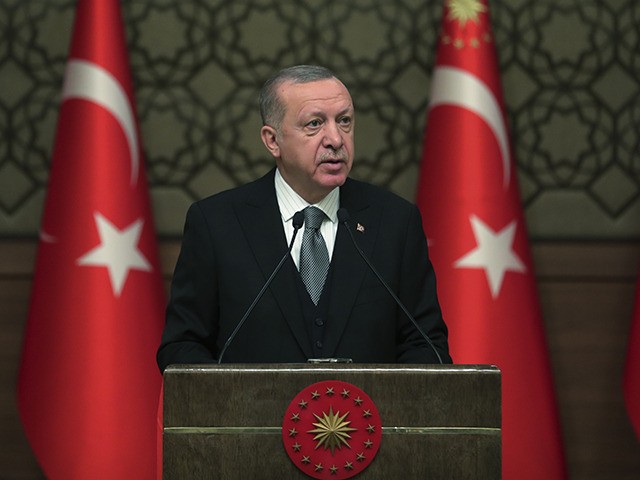Drone strikes of unconfirmed origin killed at least six people in Sulaimani province, northern Iraq, on Thursday, including multiple children. The strike, reportedly targeting members of the Kurdistan Workers’ Party (PKK), occurred near what the Kurdish outlet Rudaw described as a “village resort” popular with families.
The PKK is a U.S.-designated Marxist terrorist organization that has spent decades fighting the Turkish state. Other regional governments, like those of both Iran and Iraq, have opposed the PKK. They played a significant role in fighting the Islamic State (ISIS) in northern Iraq, where it has since established itself alongside the Yazidi minority in Sinjar where ISIS committed what is widely recognized as a genocide against them. The PKK has helped the Yazidis establish their own militia, the Sinjar Protection Units (YBS), to protect against a future jihadist incursion.
Last week, the Turkish government announced an aerial invasion of Iraq to fight the PKK, branded “Operation Claw-Eagle.” Shortly thereafter, it announced an accompanying infantry action, “Operation Claw-Tiger.”
While bombings initially began in Sinjar — largely uninhabitable due to the ISIS invasion years later — strikes have begun to occur in other parts of northern Iraq’s Kurdistan Regional Government (KRG). The one Rudaw documented on Thursday occurred near a village known as Kuna Masi and, according to a local mayor, resulted in the deaths of one “fighter” of unknown faction and six civilians, including a family of five.
Locals who happened to be recording vacation time at the resort filmed the drone strike crash on Thursday and shared with Rudaw, clarifying that those in the video are safe.
Video submitted to Rudaw shows the moment an airstrike hit near a tourist resort in the village of Kuna Masi, in Sualimani province.
🚨 Warning – Distressul images 🚨
Read more: https://t.co/uy7yiZt60Q pic.twitter.com/hUXFOWfpKb
— Rudaw English (@RudawEnglish) June 25, 2020
The report concluded that the strike had hit a shop.
The Turkish government is the likeliest responsible for drone strikes, though in recent days, Iran has joined in attacking PKK fighters on its border. The territory that Kurds are indigenous to runs through Turkey, Iran, Iraq, and Syria — land that the PKK seeks to turn into a sovereign state.
While Rudaw reported on the bombing of a shop in the region, Bas News, a Kurdish outlet with ties to the KRG, reported that the Kuna Masi bombing targeted a vehicle in which PKK fighters were believed to be traveling, killing three and “several” civilians. It is unclear if these were separate bombings.
The attacks are the latest from the air as part of Operation Claw-Eagle and the response reported on the ground more evidence that Turkey’s attacks are deeply destabilizing an already vulnerable area of Iraq. While KRG territory tends to be more stable than areas controlled directly by Baghdad, northern Iraq close to the Turkish border and close to the non-KRG city of Mosul are still recovering from Islamic state attacks. The Sinjar strikes reportedly triggered significant concern among Yazidis and may have stalled the ongoing return of displaced Yazidis that have been languishing in refugee camps. At least eight northern Iraqi villages of mixed ethnicities evacuated completely when the bombs started to drop. Christians who, like Yazidis, faced genocide at the hands of the Islamic State have also seen their reconstruction threatened by the invasion.
Turkey announced the operations in Iraq shortly after a resounding victory in Libya, where Ankara had intervened on behalf of the internationally-recognized government to stop Russia-backed warlord Khalifa Haftar from taking over the capital, Tripoli. The fight against the PKK predates the Libya intervention by decades, however. Turkish forces have also announced operations in southern Turkey and parts of Syria against the group.
Anadolu Agency, the state news outlet of Turkey, reported on Friday that the National Defense Ministry had announced new successes in Syria, where Turkey fights not only the PKK, but the U.S.-backed People’s Protection Units (YPG/YPJ) of Rojava, or Syrian Kurdistan. The YPG were integral in the defeat of ISIS in its national “capital,” Raqqa, but the Turkish government insists on seeing them as indistinguishable from the PKK.
“Turkish security forces destroyed six mortar shells trapped by PKK/YPG terrorists in the Operation Peace Spring area in northern Syria, south of Turkey’s border,” Anadolu reported. “The terrorists, who wanted to disrupt the atmosphere of peace and security in the area, trapped the mortar shells in residential areas to target innocent civilians, the ministry said on Twitter.”
Hostilities in Iraq reportedly continued on Friday in Duhok, also part of the KRG. Bas News described the exchanges as “direct” clashes between Turkish troops and PKK fighters, implying infantry was involved. The report did not note any casualties.
The invasion has alarmed both the KRG and the Iraqi government in Baghdad, which has summoned the Turkish ambassador in the country twice. On Thursday, Iraqi Prime Minister Mustafa al-Kadhimi issued a statement expressly denouncing violations of Iraqi sovereignty.
“We will not allow anyone to threaten to destroy the country,” al-Kadhimi reportedly said, a rebuke of Turkish operations within Iraqi borders.

COMMENTS
Please let us know if you're having issues with commenting.